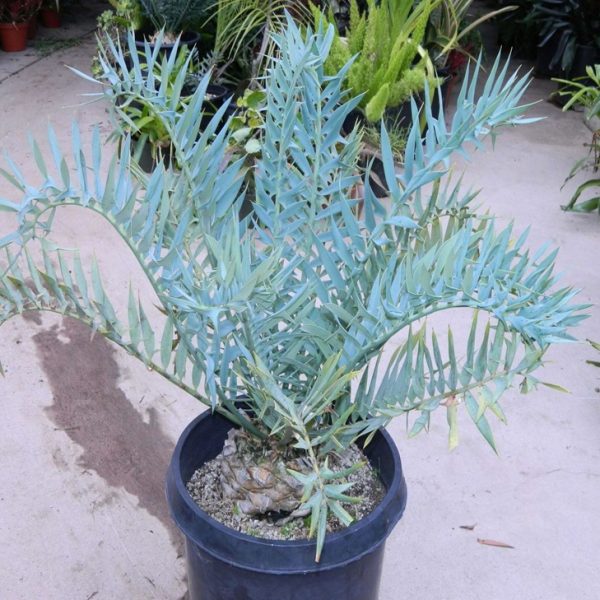Encephalartos horridus is a super cool and rare species of cycad native to South Africa, and it’s definitely a plant that grabs attention—especially with its blue-gray leaves and prehistoric, armored look. Here’s a quick breakdown of what makes it unique:
Basic Info
- Scientific name: Encephalartos horridus
- Family: Zamiaceae (cycads)
- Origin: Eastern Cape Province, South Africa
- Name meaning: “Horridus” = spiny or bristly in Latin—refers to its fearsome-looking leaflets
Appearance
- Leaves: Striking silvery-blue to blue-gray, very stiff and sharply toothed. Gives off serious dinosaur-era vibes.
- Size: Usually forms a short trunk, up to about 1.5 meters (4–5 feet), with a spread of leaves around 1 meter.
- Cones: Like all cycads, it’s dioecious, meaning individual plants are male or female. The cones are large and can look pretty dramatic—females produce seed cones, males produce pollen cones.
Growing Conditions
- Light: Full sun to partial shade.
- Water: Drought-tolerant once established. Needs well-draining soil.
- Cold tolerance: Can handle light frost, but best kept above freezing for optimal growth.
- Growth rate: Very slow-growing, but long-lived.
Conservation Status
- IUCN Status: Endangered
Threatened by over-collection and habitat loss. Because of its beauty and rarity, it’s popular among collectors—so much so that illegal wild collection is a concern.
Fun Fact:
Despite looking like a palm or a fern, cycads like E. horridus are more closely related to conifers and date back to the age of dinosaurs—these things have been around for over 280 million years!
Are you looking to grow one, or just curious about it?

Reviews
There are no reviews yet.